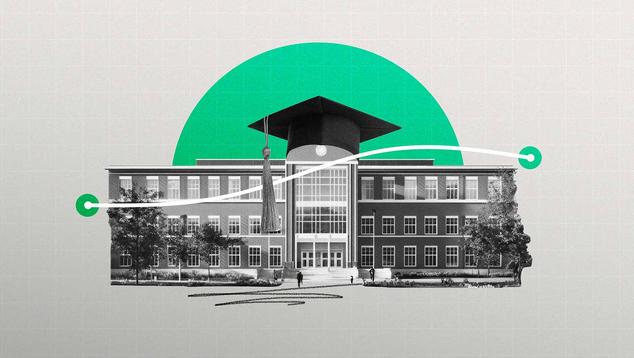WASHINGTON, D.C. — As U.S. undergraduate enrollment rebounds to near pre-pandemic levels, the latest Lumina Foundation-Gallup 2025 State of Higher Education Study reveals that interest in pursuing education beyond high school remains strong.
The majority of U.S. adults not currently enrolled in a degree or credential program (57%) say they have considered pursuing at least one in the past two years, which is similar to the 2023 figure, but much higher than in either 2021 or 2022.
These results are from the Lumina Foundation-Gallup 2025 State of Higher Education Study, conducted via web Oct. 2-31, 2024. The survey is based on 13,933 U.S. adults aged 18 to 59 who have not completed a college degree or credential program. The study includes U.S. adults who are currently enrolled, who have been enrolled but stopped taking courses toward a degree/credential, or who have never been enrolled. Respondents were recruited from an opt-in online panel.
The study finds varying degrees of interest among certain demographics of unenrolled adults. For example, those who have pursued a degree or credential at some point in the past but stopped their coursework are nearly twice as likely (68% vs. 38%) to have considered pursuing higher education compared with those who have never enrolled. Adults aged 35 or younger are also more inclined than their older counterparts to have considered obtaining a college degree or other type of credential.
Unenrolled men are more likely than their female counterparts to have considered pursuing higher education (61% vs. 52%). Unenrolled White adults, at 52%, are the least likely of any racial or ethnic group to have considered a degree or credential.
Despite women’s lower interest, recent data show U.S. undergraduate enrollment among both men and women increased last fall, with women continuing to enroll at greater rates than men. Notably, enrollment among White adults grew in the same period — for the first time since before the pandemic — whereas Hispanic and Black adults have experienced consistent enrollment growth for the past three years.[1]
These patterns suggest that while overall interest in higher education remains strong, disparities persist in who is actively considering and enrolling in these programs.
Associate and Bachelor’s Degrees Gain Traction
Interest in all types of degrees and credentials included in the study is higher today than it was in 2021, but associate and bachelor’s degrees have been garnering moderately more interest recently. The latest data find that 24% of unenrolled adults have considered an associate degree and 18% have considered a bachelor’s degree in the past two years.
At the same time, interest in certificates and industry certifications has softened slightly, with 22% considering a certificate and 16% an industry certification.
These trajectories align with broader U.S. enrollment growth, as undergraduate enrollment neared 16 million — just 1.0% below 2019 levels — rising 4.7% last fall. Associate and bachelor’s degree programs saw enrollment increases of 6.3% and 2.9%, respectively, though both remain below pre-pandemic levels.
However, certificate interest remains nearly as high as that for associate degrees, supported by strong growth in undergraduate certificate program enrollment, which rose for the fourth consecutive year (+9.9%) and now stands 28.5% above 2019 levels. Community colleges, a key provider of certificates and associate degrees, saw a 5.9% enrollment increase, reflecting their continued role in workforce-aligned education.[2]
Prospective Enrollment Remains as High as in 2023
More than eight in 10 adults without a degree or credential who have considered pursuing higher education say they are likely or very likely to enroll in a program in the next five years. Taking into account those who are and those who are not considering pursuing higher education, just under half of all unenrolled adults say they are “very likely” (22%) or “likely” (26%) to enroll in higher education in the next five years.
Adults who were previously enrolled are 23 percentage points more likely to reenroll in the next five years than are those who have never been enrolled. Prospective enrollment is comparatively high among adults aged 35 or younger, Black or Hispanic adults, and men.
Implications
The latest Lumina Foundation-Gallup study shows that U.S. adults without a degree continue to see value in higher education, with demand for credentials holding steady. Amid the shifting landscape of higher education, these findings offer positive signs for colleges, policymakers and advocates who are working to increase postsecondary attainment.
However, pursuing a degree or credential is not without its obstacles. A majority of current and prospective college students are skeptical about whether four-year institutions charge fair prices. And even though the percentage of students considering leaving their program has declined since its peak in 2022, nearly one in three students are still contemplating withdrawal. Emotional stress, mental health challenges and rising costs continue to be significant factors influencing both current students and those who have stopped out.
Interest in a degree or credential does not automatically translate into higher enrollment or completion rates without intentional action. Investing in student mental health, ensuring affordability and building strong support systems will be essential to meeting the needs of today’s learners and helping them succeed.
Learn more about the Lumina Foundation-Gallup 2025 State of Higher Education Study.
To stay up to date with the latest Gallup News insights and updates, follow us on X @Gallup.
[1] Current term enrollment estimates: Fall 2024. (2025, January 23). National Student Clearinghouse Research Center. https://nscresearchcenter.org/current-term-enrollment-estimates
[2] Current term enrollment estimates: Fall 2024.





